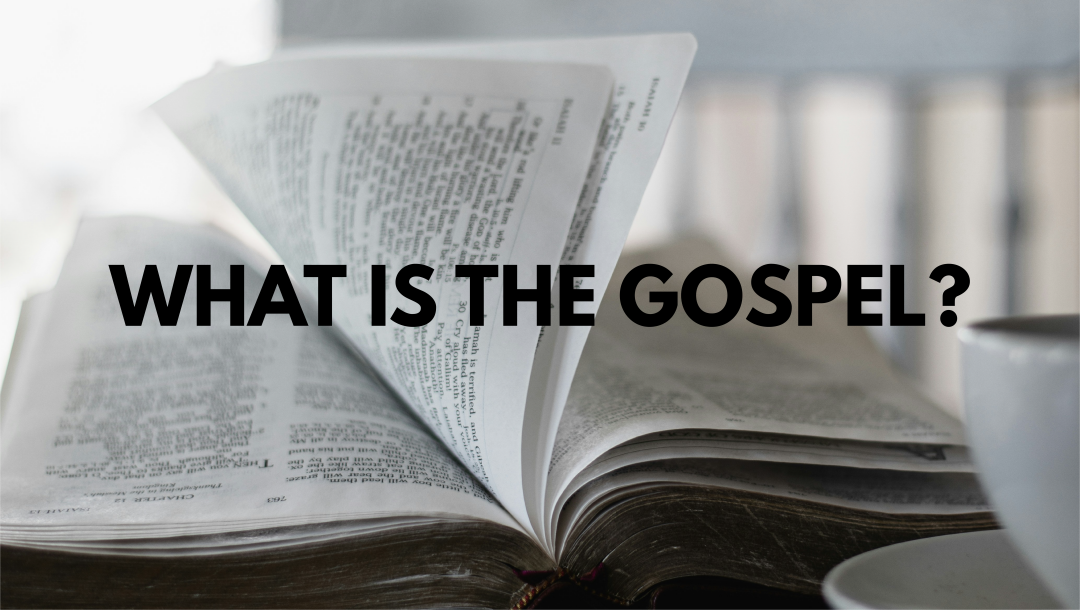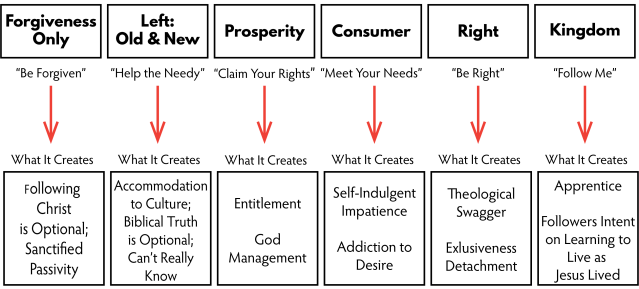
What is the gospel?
You could ask 100 different Christians that question and likely receive that number of varying responses. Sure, many of them would be rooted in the basics, the main things, but would they be complete?
I have had the great honor of working with The Bonhoeffer Project for the past five years. Our mission is to turn leaders into disciple makers by helping them reclaim a kingdom gospel, craft a personal disciple-making plan, and create a culture of disciple making in their ministries or churches. I’m sure you are aware of the many variations of the gospel floating around our world today, especially in Western and first-world cultures. Each of them has some elements of truth, but all are incomplete at best or false at worst. Bill Hull, co-founder of The Bonhoeffer Project and author of many books on the topic of discipleship, lists six different gospels in Conversion and Discipleship: You Can’t Have One Without the Other.1 In the graphic below, you’ll find a brief explanation of each one.

The first five gospels on this chart have deluded the Gospel of Jesus Christ to be more palatable to the masses and have a self-focus that cheapens the grace of God by defining what it looks like to follow God based on our own desires. James warns us of this, “... each person is tempted when he is lured and enticed by his own desire” (James 1:14). The Gospel of Jesus Christ was never meant to be only about ourselves. It was meant to be received as a gift and shared with the world around us that so desperately needs Him.
One of the assignments we have the participants of The Bonhoeffer Project complete is to ask two questions of three people close to them. The first question is, “What is the gospel?” The second question is a bit more revealing, “What do you hear me saying about the gospel?”
This exercise typically confirms what most suspect, that many people don’t have a complete understanding of what the gospel truly is and that they might not either. In this moment of clarity and conviction, they start to reconcile the gospel they are proclaiming with the one Jesus proclaimed. If they are not congruent there is work to be done, and the place to start that work is at the headwaters of Scripture. I highly encourage you to complete that exercise and allow the Holy Spirit to reveal to you where you might be missing the mark.
So, back to our original question … What is the gospel? When I wrestled with this question, I spent a good amount of time pouring over passages and digging into the red letters, the words Jesus Himself spoke about His kingdom. I learned that my definition of the gospel had to include so much more than just forgiveness. If I’m completely honest, my idea of the gospel, at least partly, was that I would receive a “get out of Hell free” card and could continue to live how I wanted. While forgiveness of sins is a crucial part of the gospel, it is not the sum of it. A full, vibrant gospel has to include the complete truth of it. The elements of the kingdom of God, Christ’s death and resurrection, and a call to faith in action through belief and repentance must all be present. Just as importantly, the command to follow Jesus has to be included as well. The idea that redemption isn’t a one-time event, it’s an ongoing process in which the Holy Spirit works in you throughout your entire life (Philippians 2:12-13).
If I had to sum up my definition of the gospel, it would be as follows (Scripture references are in the footnotes):
To even consider the truth of the Gospel, we must acknowledge and accept two things in faith;2 1) God exists3 and His kingdom is real and is here now,4 and 2) we are sinners in need of a Savior.5 Once we accept, we can confess that we need Jesus and that we want Him to cleanse us and reconcile us back to God.6 We must believe that Jesus is the Son of God,7 that He came to earth to live as a man,8 to be our example of what a sinless life looks like,9 to be spit on, beaten, whipped, and crucified as a sacrifice for our sins.10 We must believe that He died,11 was buried, and raised to life again after three days according to God’s Word.12 Our responsibility after this is to follow Him by the power of the Holy Spirit13—to immerse ourselves in learning about His character and His life14 so we can spend our lives living as He did and teaching others to do the same,15 with the promise of spending eternity with Him.16
Now, in my experience, most people I encounter don’t come right out with the question, “What is the gospel?” Most people ask less pointed questions in the course of normal conversations about what you believe and why you believe it. While I might not rattle off that entire paragraph above, I can ensure I proclaim the gospel throughout the conversation. My husband often reminds me of a saying most often attributed to St. Francis of Assisi, “Preach the gospel at all times; when necessary, use words.” That always reminds me that the life I live, the way I portray myself, is what God will use to draw people to Christ. If I am not living out what I believe, people will not ask me questions about how I can have hope in times of struggle or joy in the midst of chaos. Do you live a life that proclaims the gospel and causes people to ask you questions about Him?
Bill Hull goes on to say in his book that the kingdom gospel “is about more than forgiveness, where we will go after we die, or how to get into heaven. It is about more than self-interest and more than trying to create a better world that fits our political or religious perspectives … the kingdom gospel includes a call to self-denial. It is focused on giving ourselves for the sake of others rather than on becoming financially prosperous or satisfied religious consumers. In short, the kingdom gospel calls us to discipleship. Being a disciple of Jesus, learning from him, and submitting to his leading and his teaching is the norm rather than the exception or [an] option. It calls us to become apprentices of Christ and learn from him how to live our life as though he were living it.”17
Our mission at Bay Life Church is that “we live to glorify God by being disciples who make disciples.” This starts with a foundational understanding of the gospel. So, I encourage you to spend some time this week with the Lord asking Him to search your heart and reveal any ways you might be missing Him (Psalm 139:23-24). Do you have an incomplete understanding of the gospel? Take steps today to reconcile that in God’s Word. Allow the Holy Spirit to lead and guide you into all truth and transform the way you live your life so that your actions are in line with your beliefs (John 16:13). Just like Paul, you are “called to be an apostle, set apart for the gospel of God” (Romans 1:1).
“For I am not ashamed of the gospel, for it is the power of God for salvation to everyone who believes…”
Romans 1:16
Live unashamed.
FOOTNOTES
2 Hebrews 11:1, 6
3 Romans 1:20
4 Mark 1:14-15; Luke 17:21
5 Luke 19:10; Romans 3:10, 23
6 Romans 10:9
7 Matthew 3:17; John 1:14
8 Philippians 2:5-8
9 2 Corinthians 5:21
10 Isaiah 53:3-5
11 Matthew 27:50
12 1 Corinthians 15:4
13 John 3:6-8, 15:26; Acts 1:4-5
14 Deuteronomy 11:18-23; Joshua 1:8
15 Matthew 28:19-20; 1 Peter 2:21-24; 2 Corinthians 3:18
16 John 3:16; 1 John 5:13-14
17 Bill Hull, Conversion and Discipleship: You Can’t Have One Without the Others (Grand Rapids, MI: Zondervan), 2016, p. 39.
